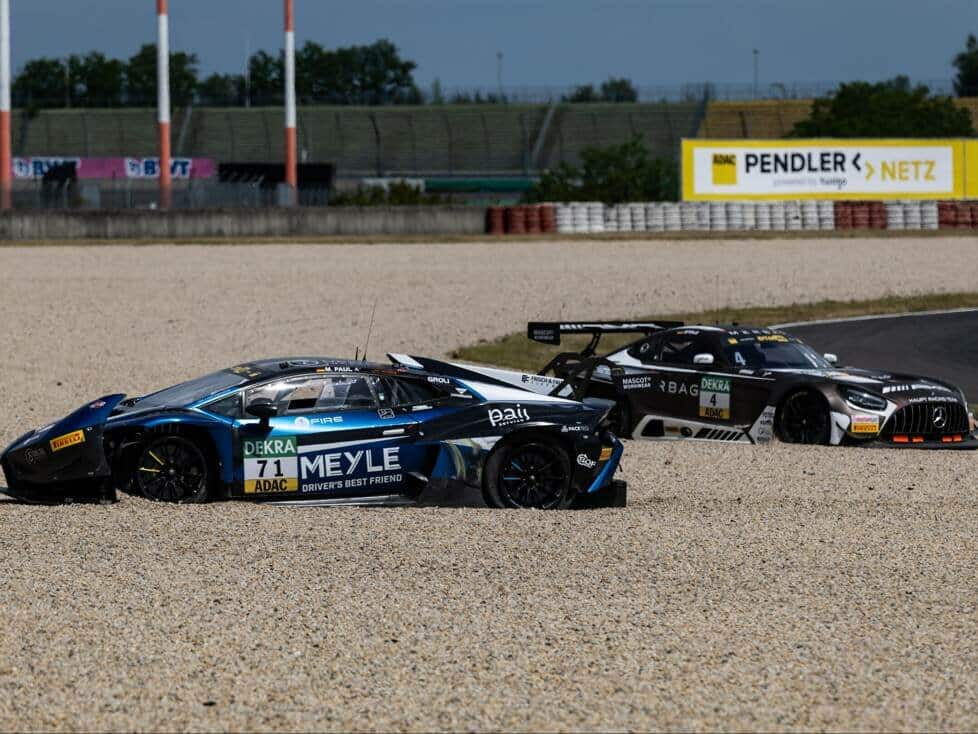After the crash involving Luca Stolz and Maximilian Paul, the cars were in the gravel for ages before the DTM race control brought out the safety car: This causes astonishment
One scene at Sunday’s DTM race at the Lausitzring (click here for the race report) caused some astonishment: After the collision between Mercedes driver Luca Stolz and Lamborghini driver Maximilian Paul, the cars were stuck in the gravel for eleven minutes before they were recovered after the 20-minute pit stop window had closed. But why did race director Sven Stoppe wait so long?
“It’s been ages since I’ve seen two cars standing in the gravel and driving on for so long”, “You’d have to talk to Sven about what the background was and whether that was the right approach. Probably the pit stop window, that they wanted to make it the same for everyone.”
Many other drivers suspected the same. After all, the race at Oschersleben was influenced by full-course yellow periods on both days, which led to criticism from the teams, even though they spoke out against a change in regulations before the Lausitz weekend
Why FCY would not have distorted the course of the race
“Nobody was a fan of the result at Oschersleben. It was purely a race of luck, and from that perspective you can’t make everyone happy,” Kelvin van der Linde showed understanding immediately after the race. Winner Thomas Preining replied: “It’s not ideal, but you can’t say that you can’t crash in those 20 minutes either. “
In fact, immediately after the crash, Christian Engelhart and Maro Engel were the last two drivers to pit who had not yet completed their mandatory stop – presumably in the hope of benefiting from full-course yellow. Stoppe could therefore have waited briefly until the drivers had completed their stops and then neutralized the race with full-course yellow or the safety car.
This is how the race director explains his decision
Why didn’t he do that? “The cars were safe in the gravel, the drivers were long out of the car, the yellow flag was shown locally”, that, in his view, there was no imminent danger and the situation did not require an FCY, especially as overtaking was prohibited at the spot anyway.
“As it had been discussed with the teams before the weekend, we did not deploy a safety car during the pit stop phase,” he added. “That came immediately afterwards.”
The fact that he waited until the safety car phase to have the vehicles recovered is due to the FIA regulation that, since the tragic accident involving Jules Bianchi, who crashed into a recovery vehicle at the 2014 Formula 1 race in Suzuka, no personnel are allowed to enter the danger zone under the yellow flag.
“Unpleasant when cars are in the gravel during races “
It cannot be ruled out that the tension in the race was also a factor in Stoppe initially deciding against FCY. After all, the safety car restart at the end of the pit stop window meant that the gaps in the field shrank once again with 13 minutes to go.
The fact is, however, that the drivers want to discuss the issue with Stoppe. “As it was, it worked well, but of course you also trust a little that no damage will occur to any of the cars and that the drivers will stick to the rules,” says veteran Engel.
“Of course, I always took it easy and made sure that I slowed down in the middle sector,” he says. “But it’s always unpleasant when the race is on and there are cars in the gravel. That’s not ideal. “





